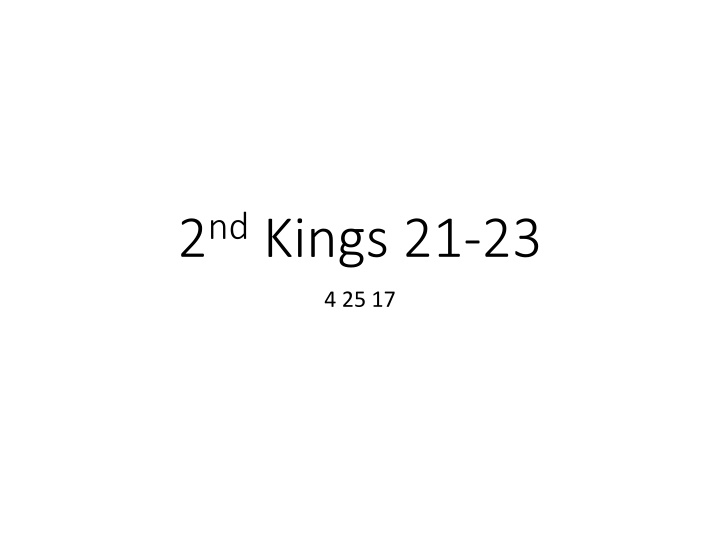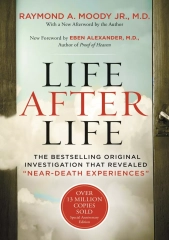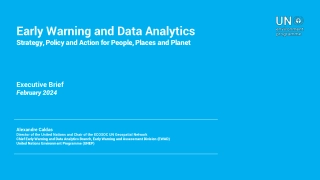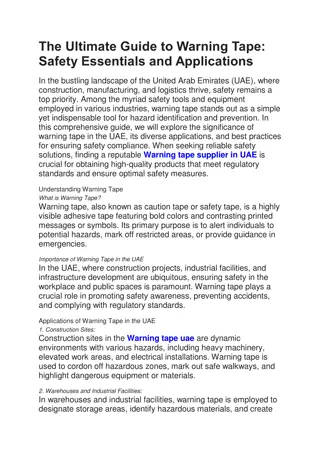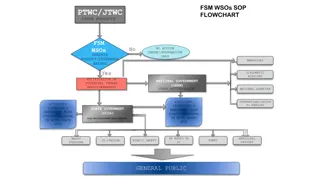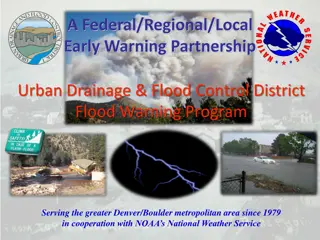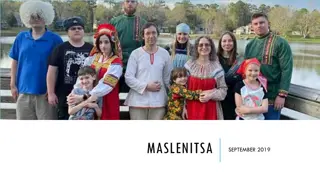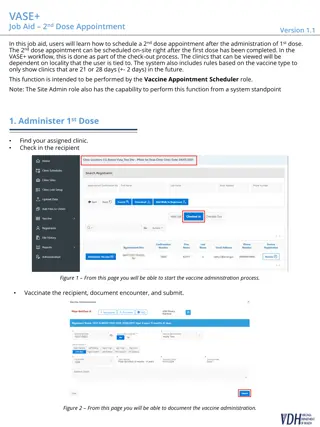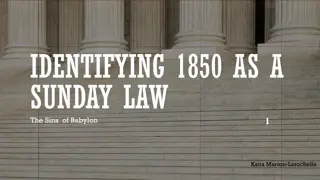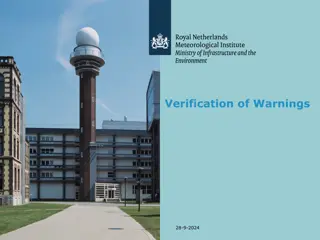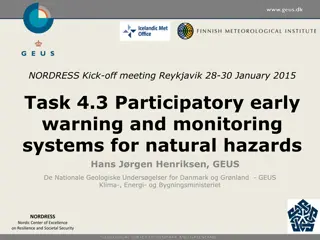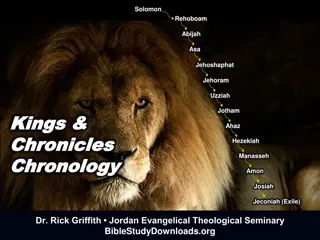Warning Against Pagan Practices Revealed in 2nd Kings
Explore the tale of King Manasseh's descent into evil in 2nd Kings 21, highlighting the dangers of pagan worship and disobedience to God's laws. Dive into the historical context of the curse of the Amorites and the prophetic messages of Amos in this insightful study.
Download Presentation

Please find below an Image/Link to download the presentation.
The content on the website is provided AS IS for your information and personal use only. It may not be sold, licensed, or shared on other websites without obtaining consent from the author.If you encounter any issues during the download, it is possible that the publisher has removed the file from their server.
You are allowed to download the files provided on this website for personal or commercial use, subject to the condition that they are used lawfully. All files are the property of their respective owners.
The content on the website is provided AS IS for your information and personal use only. It may not be sold, licensed, or shared on other websites without obtaining consent from the author.
E N D
Presentation Transcript
2ndKings 21-23 4 25 17
2ndKings 21 2ndKings 21:1-2 Reading this we might think, I have heard this before! But one thing is new at this point, the people of Judah have become so bad that they are like the people of the land when Israel first entered the Promised Land Look at Du 8:20 *1 where God warned the people about acting like this
2ndKings 21 (Cont) 2ndKings 21:3-9 Earlier, Hezekiah had destroyed all of the pagan temples that he inherited from his father Ahaz, who had turned the temple into a pagan pantheon At this time Manasseh not only rebuilds but seems to go even further in rebuilding the pagan altars To make things worse, he offers his son as a burnt offering Then he goes on to promote the various mediums prohibited by the Law of Moses (Lv 19:31*2) Finally, he is said to have done more evil than those living in the Promised Land before Israel entered under Joshua
2ndKings 21 (Cont) 2ndKings 21:10-12 There is a double image here: First in Genesis 15:13-16 *3 God says to Abraham your descendants shall be slaves in a foreign land . I will bring them back here for the iniquity of the Amorites is not yet complete And in Deuteronomy 9:4-6 *4 God says to the Israelites the reason why I am bringing you into this land is to fulfill the promise to Abraham and to use you as an instrument to remove the wicked (Amorites) from the land We saw this earlier in the Prophet Amos
Amos 760-753 BC Pre Ex Amos falls within the historical context of 2ndKings 14 & 15 Jeroboam II is king in Israel (786 756 B.C.) Azariah (Uzziah) is king in Judah (800-783 B.C.) and was a leper His son Jotham serves as the al bayith until the death of his father and then he takes over as king Jeroboam II is a very powerful king who is expanding the borders, prestige, and wealth of Israel under the prophesies of Jonah
Amos (Cont) Amos is a simple herdsman/shepherd and a dresser of sycamore-trees (not a professional prophet) He lives in Tekoa, a village about five miles south of Bethlehem on the edge of the Judean desert God calls him to prophesy to the polytheists of Israel at Bethel during the reign of Jeroboam II (783-743) when Israel is wealthy and the rich exploited the poor He condemns corrupt city life, social injustice, the deceitful consolation of insincere ceremonies He predicts the salvation of those who stay faithful (the remnant of Joseph)
Amos (Cont) Often the name of a prophet has something to do with his character or mission Amos means burden He is sometimes called the firebrand among the prophets Most Old Testament prophets split their message between doom and gloom vs happy stuff like a restoration In his book Amos tells his listeners that they are all going to die It is a heavy burden to read right up to the last chapter
Amos (Cont) He proclaims hope for the faithful who would remain as a remnant (Anawim) And he uses the prophetic rib (Hebrew lawsuit) as he calls the people to turn back and be dependent on God (Ps 50) He is the first among the canonical prophets to speak about the Gentiles coming into the faith Parts of his message will be echoed by all the rest of the prophets He is prophesying just before Samaria falls to the Assyrians in 721 B.C. He will be quoted in Acts 15 at the first council of the church by the Apostle James, Bishop of Jerusalem
Amos (Cont) Stephen, the first martyr, quotes from Amos in his long speech in Acts 7 Amos was very important for the early Christians By contrast, today very few Christians are aware of his important message Most think of famous cookies when they hear the word Amos !
Amos (Cont) Amos 2:7-9 To understand the reference to the Amorites we need to look at Genesis 15 The Amorites over time are seen as a particular Gentile nation or tribe in living in the region Abraham was called by God from Chaldea and came all the way over to what is called the Promised Land
Amos (Cont) Genesis 15:7; 13-16 The word Amorite, like the word Canaanite, can mean a specific Gentile nation or the people of the land God is telling Abraham that he will return to the Promised Land (from Egypt) but not until the iniquity of the Amorites is complete This means that the people of Israel will not take possession of the Promised Land until the wickedness of the Amorites reaches a certain threshold
Amos (Cont) Look at Du 8:18-20 *5 God warns the people of Israel that if they become like the nations that He removed they will perish Also look at Du 9:1-5 *5 God calls them to conquer the land because God needs a nation to go in and wipe out the pagan nations that were there because of their wickedness Israel gets the job to do this because they are the descendants of Abraham Again, he warns them that if they become like the nations they are driving out, they shall perish
Amos (Cont) Now turn to Joshua 23:6-14; 24:14-28 *6 Here Joshua reminds the people (just before they entered the Promised Land ) how Abraham was called from Ur of the Chaldeans because they were serving pagan gods He brought them into the Promised Land but they moved down to Egypt where they again worshiped the pagan gods of Egypt Once again God brought them out of Egypt (after 430 years) back to monotheism in the Promised Land
Amos (Cont) He warned them that if after cleansing the land of paganism (polytheism) they reverted to the paganism, they would be chased out of the land This warning was proclaimed in the Old Testament over and over Back to 2ndKings 21:13-18
2ndKings 21 (Cont) 2ndKings 21:13-18 The second image here in 2ndKings 21:13-16 is the fulfilment of that prophesy God indicates that he will destroy Jerusalem and Judah even though they were of the line of David, just as He had destroyed Samaria under the rule of Ahab This was because the people of Judah had become even more wicked than the original people of land God s plan was to remove them from the land After Manasseh dies his son Amon will rule in his stead
2ndKings 21 (Cont) 2ndKings 21:19-26 Amon was even more evil than his father! In fact, he was so evil that his servants killed him, leading the people of Judah to kill these servants and raise Josiah, the son of Amon, to the throne of David Before we lose all hope, we will be introduced to the good news of Amon s son, Josiah, who will be one of the greatest and most faithful kings since David
2ndKings 22 2ndKings 22:1 Josiah is: The grandson and son of two very wicked kings Manasseh and his son of Amon A monotheist and a righteous king who kept the Torah perfectly Very rare among the kings of the Old Testament His first act as king was to make sure that the money collected for the temple was going into its restoration At this point the temple was in a state of disrepair as it had become a pagan pantheon under the two previous kings
2ndKings 22 (Cont) One can imagine the types of sacrifices that had been going on in the temple We will hear of some of these abominations later from the prophet Ezekiel As we just saw the prophet Zephaniah was also prophesying during the reign of King Josiah
2ndKings 22 (Cont) 2ndKings 22:2 Josiah was a monotheist Even though he called for the restoration of the temple, he could not go right after polytheism because most of the people were polytheistic pagans On the other side of the Kidron valley, the Mount of Olives was covered with pagan temples from the time of King Solomon So before Josiah could clean the place up he needed some backup God gives that to him as he begins the repair of the temple
2ndKings 22 (Cont) 2ndKings 22:3-8 The king sends the high priest off to oversee the restoration of the temple Suddenly, the high priest tells the king s secretary that he has found something of importance to both the secretary and the king The high priest tells the secretary that he has found within the temple a book of the Torah (most likely the scroll of Deuteronomy) The temple was the last place one would have thought something like that would be found as it had been used as a pagan pantheon for many years
2ndKings 22 (Cont) We remember that the Torah spoke very clearly against polytheism So this scroll must have been well hidden, perhaps covered with dust behind a statue of Baal for a long time
2ndKings 22 (Cont) 2ndKings 22:9-10 After verifying that the money was being used for the reparation of the temple, the secretary tells the king that he has some more good news from the high priest The secretary does not know what the scroll is all about so he reads it before King Josiah
2ndKings 22 (Cont) 2ndKings 22:11-13 The king rent his clothes because this was most likely the first time in his life he had heard that part of the Law of Moses Father Sebastian suggested that we try and wrap our brains around that idea, because as bad as things are today, they were not that bad Imagine that you enter a Church and cannot find a copy of the Bible on the premises Before reading this passage one would assume that copies of the Books of the Torah would have been readily available in the temple
2ndKings 22 (Cont) Obviously, no one has been living in accordance with these decrees for many years and one can see why the king gets a bit scared The author of 2ndKings repeats twice the words of this book Look at Deuteronomy 6:1-9 *7 which tells Israel to teach their children that there in only one true God Josiah recognizes that his fathers have not done what they were supposed to have done They have not passed on the truth of monotheism So after the king rents his clothes he commands his advisors to go and inquire of the Lord what the words of this book mean for the people of Judah
2ndKings 22 (Cont) The Torah at that time would have consisted of five separate scrolls and what they found was most likely the scroll of Deuteronomy Look at the irony here, as the king reads the text for the first time in his life, he finds Deuteronomy 17:14-20 *8 which dictates what a king must and must not do It also directs that the king make a copy of Deuteronomy and read it day and night
